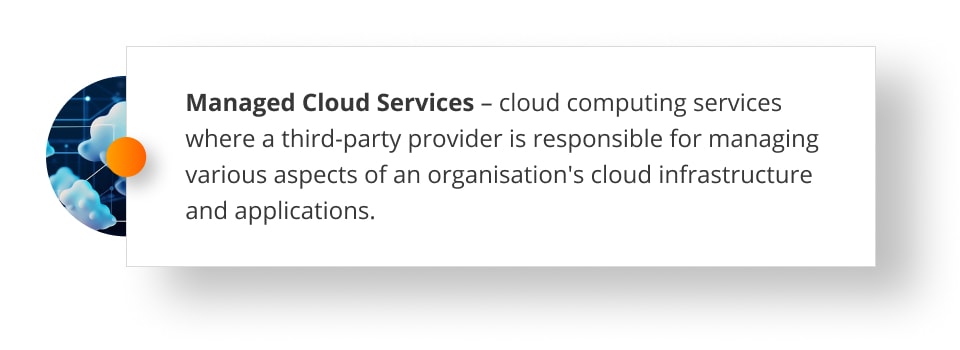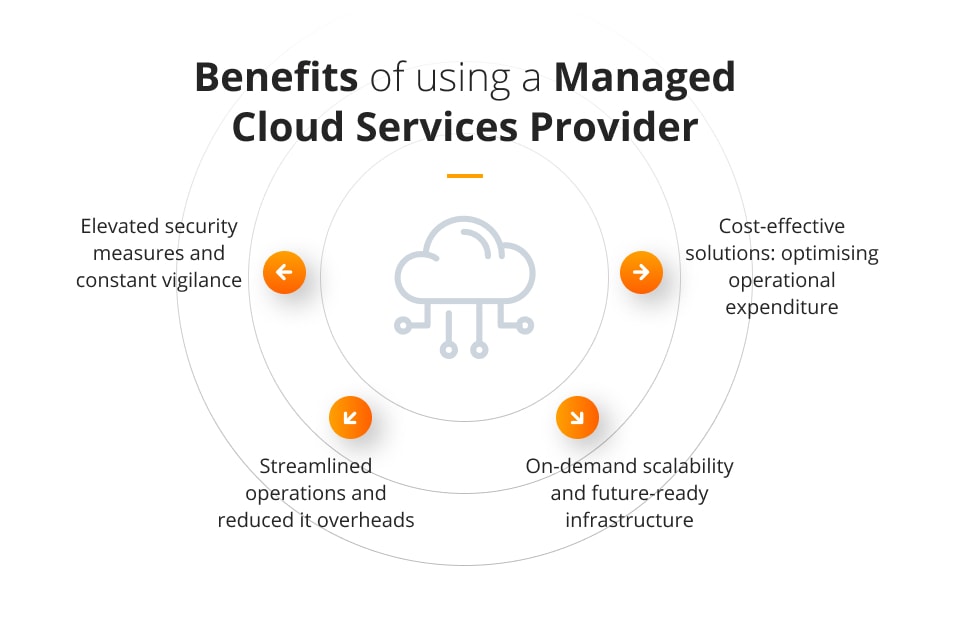
Managed Cloud Services: 4 game-changing benefits
How important Managed Cloud Services are and what benefits such an approach brings to organisations? How difficult is it to choose the right Managed Cloud Services provider? To find answers to these questions, take a look at our guide.
When we say Managed Cloud Services we mean cloud computing services where a third-party provider is responsible for managing various aspects of an organisation’s cloud infrastructure and applications.
The rising importance of cloud computing in the digital era
In the recent years we noticed an unprecedented migration of companies to cloud computing. Latest statistics say that as much as 60% of the world’s corporate data is now stored in the cloud.
Cloud computing offers several important benefits, such as scalability and flexibility, cost efficiency, global reach and innovation. It allows employees to work remotely and from different locations, it facilitates access to documents, and guarantees business continuity and disaster recovery.
What’s more, it allows to address the ever-growing problem of the gap in the talent pool and to cut back on the costs of employment.
Given all the advantages, it is no wonder so many organisations decide to move to the cloud. And with that important move, there is also a great interest in Managed Cloud Services, which free organisations from the responsibility of buying and maintaining all their cloud resources by handing their management to experienced providers.
Cloud Managed vs. Unmanaged Services: decoding the cloud solutions spectrum
But are Managed Cloud Services for you? Would your organisation benefit from such an approach? Before you decide to go for them, it’s worth considering differences between them and Unmanaged Services. Here is a short summary:
Managed Cloud Services, where an external partner takes on various management responsibilities, including infrastructure provisioning, cloud security management, maintenance, monitoring, and support, allow organisations to offload many technical tasks to experts, leaving them more time and resources to focus on their core business functions.
Advantages of such an approach include better security and compliance, expertise offered by an external partner, reduced workload, better costs efficiency and improved scalability, as well cost predictability.
Given all those aspects, Managed Cloud Services are ideal for organisations that want to focus on their core business without dedicating significant resources to IT operations. They are also great for organisations that lack in-house expertise and need reliable, scalable, and well-maintained cloud solutions.
By Unmanaged Cloud Services we mean a cloud solution where organisations maintain full control and responsibility over their infrastructure and applications. Among their benefits one can list flexibility to build and manage cloud environment according to specific requirements.
Unmanaged Cloud Services are suitable for organisations with strong-in-house IT teams that possess the expertise to effectively configure and manage cloud resources. They are often chosen by businesses with unique or complex requirements that cannot be met by pre-packaged managed services.
In summary, the decision of whether to use Managed or Unmanaged Services depends on every organisation’s specific situation, cloud strategy, needs and requirements.
Benefits of using a Managed Cloud Services Provider
If you are still thinking whether Managed Cloud Services is something you should consider, take a look at the most important benefits of using a trustworthy Managed Cloud Services Provider.
Elevated security measures and constant vigilance
Using a Managed Cloud Services provider guarantees an elevated security measures and constant vigilance.
The security of every cloud environment is of paramount importance, as it involves protecting sensitive data, applications, and infrastructure from a wide range of potential threats.
If you decide to use a good Managed Cloud Service provider you can be sure they will take care of your data encryption, identity and access management, firewalls and network security, IDPS and SIEM.
They will also ensure there will be 24/7 monitoring of your cloud environment to detect and respond to security incidents in real-time, they will have a well-defined incident response plan in place and will conduct regular security audits and penetration testing to identify and address vulnerabilities.
Cost-effective solutions: optimising operational expenditure
Managed Cloud Service providers often offer most cost-effective solutions. By leveraging their infrastructure and expertise, you can save money on IT infrastructure, staff, and ongoing maintenance.
They also allow businesses to shift from capital-intensive infrastructure investments to an operational expenditure model, meaning you don’t have to spend a significant amount on purchasing and maintaining physical servers, storage, and networking equipment.
What’s more, such providers serve numerous clients on a shared infrastructure, which allows them to distribute the costs of infrastructure, security, and expert staff across multiple clients, resulting in lower costs for individual businesses.
These cost-effective solutions enable businesses to focus on their core operations and growth, rather than being burdened by the complexities of managing their own infrastructure.
Streamlined operations and reduced IT overheads
Managed Cloud Service providers have specialised expertise in cloud technologies and best practices. They handle tasks like infrastructure provisioning, maintenance, security, and performance optimisation, allowing your internal IT team to focus on strategic projects rather than routine operations.
They continuously monitor your cloud resources and make recommendations for optimising resource usage, which ensures you’re not overspending on unnecessary resources.
By outsourcing your cloud management to an external provider you eliminate the need to hire and train additional IT staff, invest in infrastructure, or maintain data centres.
On top of that, Managed Cloud Services allow for more automation, flexibility and self-service, facilitating more savings within an organisation.
On-demand scalability and future-ready infrastructure
Managed cloud services offer on-demand scalability and future-ready infrastructure, providing businesses with the agility and adaptability needed in today’s dynamic digital landscape.
They offer flexible resource allocation, allowing businesses to quickly scale their cloud resources up or down as needed.
They monitor resource usage and provide recommendation for optimising resource allocation. What’s more, with Managed Cloud Services providers you pay for resources as you use them, which means there is no need for any signification capital investment in hardware or infrastructure.
Additional perks of embracing Cloud Managed Services
The benefits we described are not to only ones offered by Cloud Managed Services providers.
Among many others, it’s worth noting that the global presence of many Cloud Managed Services providers allow businesses to expand their digital footprint and reach a global audience without the need to set up physical infrastructure in each location.
Another important perk is cost predictability, which makes it easier to budget and plan for IT expenses.
A huge advantage is also access to a talent pool offered by third party providers – otherwise getting access to specialised IT professionals who can assist with complex tasks or projects can be difficult.
Selecting the right Managed Cloud Service Provider: top factors to consider
If you decide to use Managed Services providers, it is extremely important to choose them wisely.
The top factors to consider are:
- their expertise and experience in your industry and the specific cloud platforms you are keen to use,
- their partnerships with AWS, Azure etc,
- their readiness to engage in value measured approach,
- their service offerings and customisation,
- their scalability and elasticity in work,
- their security practices and compliance with regulatory requirements,
- their attitude towards disaster recovery and backup.
It is also worth checking references of the external partner you are keen to collaborate with, as well as opinions of their previous clients.
That’s done, arrange an interview to decide whether their style of work and communication is something you are keen to accept on daily basis.
Remember that relying an a third partner requires a lot of trust, so transparency when it comes to their operations and work is crucial. Before your meeting prepare a list of questions you would like to ask and don’t be shy to go into details.
Read more about Cloud services:
- How Cloud enables Digital Transformation and accelerates it?
- Infrastructure as a Service in cloud computing
- Hyperscale Cloud 101: guide to mega-scaling your business
Paving the way for business innovation with Managed Cloud IT Services and Future Processing
In today’s digital era, cloud computing is not just a technology but a strategic enabler, empowering organisations to harness the latest digital tools and technologies.
Cloud Managed Services allow organisations to take the full advantage of cloud computing without sacrificing their resources on managing it.
With that in mind, don’t wait any minute longer if you are keen to start thinking about Cloud Managed Services.
Get in touch with our team of IT experts and together let’s see how we can help you achieve your business goals.







